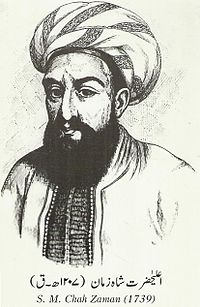Zaman Shah
| Zaman Shah Durrani زماں شاہ درانی |
|||||
|---|---|---|---|---|---|
| Shah of the Durrani Empire Durr-i-Durrani ("Pearl of Pearls") |
|||||
 |
|||||
| 3rd Durrani Shah | |||||
| Reign | 1791-1800 (7 years reign) | ||||
| Coronation | 1793 | ||||
| Predecessor | Timur Shah Durrani | ||||
| Successor | Mahmud Shah Durrani | ||||
| Born | 1770 | ||||
| Died | 1844 | ||||
| Burial | 1844 | ||||
|
|||||
| Dynasty | Durrani | ||||
| Father | Timur Shah Durrani | ||||
| Religion | Islam | ||||
| Full name | |
|---|---|
| Zaman Shah Abdali Dur-e-Durran |
Zaman Shah Durrani, (Pashto, Persian, Urdu, Arabic: زماں شاہ درانی), (c. 1770 – 1844) was ruler of the Durrani Empire from 1793 until 1800. He was the grandson of Ahmad Shah Durrani and the fifth son of Timur Shah Durrani. An ethnic Pashtun like the rest of his family and Durrani rulers, Zaman Shah became the third King of Afghanistan.
He seized the throne of the Durrani Empire on the death of his father, Timur Shah. He defeated his rivals, his brothers, with the help of Sardar Payenda Khan, chief of the Barakzais. He extracted an oath of allegiance from the final challenger, Mahmud, and in return relinquished the governorship of Herat. In so doing, he divided the power base between Herat and his own government in Kabul, a division which was to remain in place for a century. Kabul was the primary base of power, while Herat maintained a state of quasi-independence. Kandahar was fought over for the spoils.
During his reign he tried to combine his dispersed relatives together who were deported by his father Timur Shah. His uncle Saifullah Khan Durrani, his sons Mohammad Umar, Bashir Ahmad Khan and Shams Ur Rehman, his cousins Faizullah Khan and Abdullah Khan lived in Akora Khattak in present-day Khyber Pakhtunkhwa. They were contacted to come back to Afghanistan but without success. Saifullah Khan died in 1779 and after that the family was led by Faizullah Khan but he disliked the bad habits of Abdullah Khan and Bashir Ahmad Khan and left Akora Khattak and went to Bannu without informing his relatives. Later on, after the death of his wife, Abdullah Khan Durrani migrated to Kohat in 1791 where he married a widow, Pashmina.
...
Wikipedia
